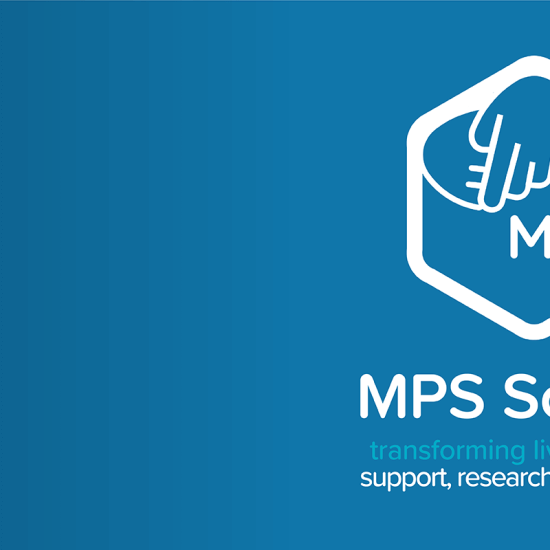This week is MPS Awareness Week, an annual event hosted by the MPS Society to raise awareness of the often debilitating mucopolysaccharidosis (MPS) conditions and encourage those affected to share their stories.1
Mucopolysaccharidosis is not a single disease, but rather a group of seven genetic disorders with a total of 13 subgroups.2 As a group MPS is rare, affecting approximately 1 in 25,000 live births, although the incidences of individual types are rarer still – MPS VI, for example, is the rarest, occurring in 1 in 250,000–600,000 live births.2
MPS conditions are characterised by inherited deficiencies of specific enzymes responsible for breaking down glycosaminoglycans (GAGs) in the lysosomes of cells (they are therefore part of a larger family of disorders called lysosomal storage disorders, or LSDs). GAGs are cellular waste products which are normally degraded and recycled in lysosomes. For people with MPS, one or more specific enzymes needed for this are deficient, which leads to the progressive accumulation of GAGs in many tissues of the body, both intracellularly and extracellularly.2,3
Clinically, patients can present with a spectrum of disease severity, even within the same MPS disorder, depending on how much residual enzyme activity they have.3 The disorders can lead to death within the first few months of life for some people, while others may suffer only mild signs and symptoms and live a normal lifespan.2 The accumulation of GAG degradation products causes multiorgan dysfunction involving tissues of the skeletal, ocular, nervous, respiratory, cardiac, and gastrointestinal systems.2 Cognitive impairment is also a feature in many patients.3 While there are some differences in clinical presentation between the MPS types, musculoskeletal manifestations are common across all forms of MPS.3 These may include joint stiffness and contracture, carpal tunnel syndrome, trigger digits, degenerative joint disease, and growth abnormalities – short stature is common in all MPS disorders.3 Due to the combined effects of joint contracture, foot and hip abnormalities, and genu valgum (knock-knees), patients’ gait is often affected which can compromise their ability to walk independently, and therefore further contributes to their reduced quality of life.3
Because of the variability in clinical presentation and the similarities with other conditions such as rheumatoid arthritis (RA) and juvenile idiopathic arthritis (JIA),3 diagnosis is often delayed. Indeed, many children and young adults suffer for years before MPS is recognised, during which time irreversible organ damage can occur.3 Raising awareness of MPS is therefore paramount to ensure early diagnosis and initiation of treatment.
For those who can be treated with haematopoietic stem cell transplantation (HSCT) or recombinant human enzyme replacement therapy (ERT), the course of the disease can be changed resulting in improved outcomes. Despite this, severely affected patients may still need surgery. Unfortunately, not all forms of MPS have an ERT available – ERT is currently only available for MPS I, II, IVA, VI, and VII;3 research is ongoing to develop more treatments, including targeted gene therapy.2
Only by raising awareness of MPS can patients be diagnosed and treated in a timely manner, in order to prevent irreversible organ damage and enable them to achieve the best possible outcomes. To learn more about MPS Awareness Week and how you can get involved, visit https://mpssociety.org.uk/events/mps-awareness-week.
Here at Solaris Health, we have a long experience of helping clients and patients with their communication goals in the rare disease space, including LSDs. If you work on, or manage patients with, MPS or other LSDs and you would value help communicating your messages, please don’t hesitate to contact us.
References
- MPS Society. MPS Awareness Week. Available at: https://mpssociety.org.uk/events/mps-awareness-week (Accessed May 2025).
- Nagpal R, Goyal RB, Priyadarshini Ket al. Mucopolysaccharidosis: A broad review. Indian J Ophthalmol. 2022;70(7):2249-2261.
- Cimaz R, La Torre F. Mucopolysaccharidoses. Curr Rheumatol Rep. 2014;16(1):389.
- Wang RY, da Silva Franco JF, López-Valdez J, et al. The long-term safety and efficacy of vestronidase alfa, rhGUS enzyme replacement therapy, in subjects with mucopolysaccharidosis VII. Mol Genet Metab. 2020;129(3):219-227.
- Sawamoto K, Álvarez González JV, Piechnik M, et al. Mucopolysaccharidosis IVA: Diagnosis, Treatment, and Management. Int J Mol Sci. 2020;21(4):1517.


